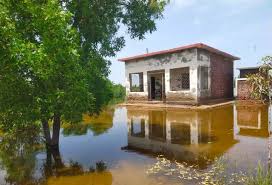
By Maria Jabbar
A flood is more than a rush of water — it’s a force that sweeps away the delicate fabric of daily life. When the 2022 floods hit Pakistan, Sanghar district in Sindh was among the worst affected, and no one felt the impact more than young girls struggling to stay in school.
Before the disaster, Sanghar was already grappling with deep-rooted educational challenges. Female literacy hovered around 33.9%, limited by poverty, long distances to schools, and cultural barriers. Education for girls was fragile — an achievement that could unravel with a single crisis.
Across Pakistan, over 27,000 schools were damaged or destroyed, 20,000 of them in Sindh alone. In Sanghar, nearly 100 schools were turned into makeshift shelters. Classrooms became relief camps overnight. Books and blackboards were replaced by bedding and food rations. For many girls, this was the end of the road.
Families who lost their homes were forced to make impossible choices. Survival came first. Education came last. Many girls were pulled out of school to care for siblings, fetch water, or help rebuild homes. Some were married off early, as desperate families tried to reduce expenses.
The numbers tell a heartbreaking story. In one village school, almost half the girls never returned after the waters receded. Even where schools reopened, attendance stayed low. The dream of education had been drowned under layers of mud and hardship.
But this catastrophe was not inevitable. Stronger, flood-resistant school buildings, early warning systems, and emergency learning plans could have saved classrooms — and futures. Instead, the disaster exposed how unprepared rural areas remain.
Now is the time to act. Sanghar’s girls deserve better. Rebuilding efforts must prioritize:
- Repairing and strengthening girls’ schools.
- Providing free learning kits, uniforms, and safe transport.
- Setting up temporary classrooms so no child falls further behind.
- Running awareness campaigns to convince families that education is still possible — and vital.
Disasters don’t just damage infrastructure; they deepen inequality. If we fail to help Sanghar’s daughters return to class, the flood’s impact will echo for generations.
Education is not a luxury. It’s a lifeline. Let’s not allow the flood to wash away the hopes of an entire generation of girls.
